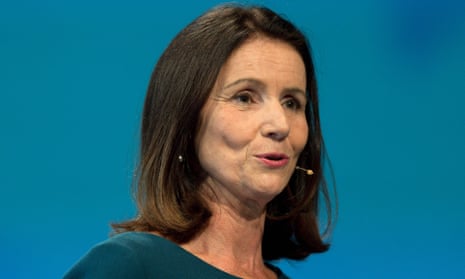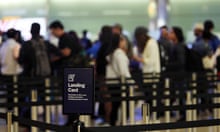Theresa May must avoid making any new immigration system too bureaucratic or risk harming Britain’s businesses, the CBI director general Carolyn Fairbairn has warned.
Sources suggest ministers hope to negotiate a Brexit deal that would allow the government to control high- and low-skilled immigration.
But Fairbairn issued a stern warning to Downing Street, saying a new, tougher system outside the EU could create an unmanageable burden for employers and deprive firms of the workers they need.
“Whatever new system comes in, and businesses recognise there will be one, make it easy: make it administratively straightforward, and flexible and speedy, because actually if it takes six months to bring somebody in, and your project starts next week, then in terms of productivity it will take us backwards,” she said.
Fairbairn said the CBI was in regular touch with the Home Office to impress upon the government the need to make any new controls workable.
“We think it needs to be evidence-based; it needs to understand different kinds of migration – students, skilled labour, less skilled labour, different job categories. But whatever system comes in – ease of use,” she said. “Particularly in this fast, flexible, competitive world that we’re in. If it’s just going to be leaden, and heavy, and bureaucratic, we will lose out.”
Speaking to the Guardian as the CBI launches a new report analysing the factors that make some regions more economically successful than others, Fairbairn urged the government to invest more in boosting school standards in order to help address the financial concerns that led to Brexit.
In response to the report’s finding that GCSE results were the key factor in determining local economic performance, she said: “I was really fascinated by this. The dominant factor was educational attainment at the age of 16. It was kind of obvious, and we knew it, but it still brought me up short to see it in black and white.”
She argued that replicating the improvement in school performance achieved in London over the past decade elsewhere in the country could help to narrow the economic divide. “If you’re a local business, you are recruiting from your local labour pool, who were educated locally, and educational attainment at the age of 16 is absolutely fundamental. The variability between our schools in our country is huge.
“One of the really interesting opportunities is for education to be thought of as part of industrial strategy. And it’s something which I think this government is really open to.”
David Cameron’s government published a white paper on improving schools standards in the spring, but the central thrust of May’s approach has been allowing more grammars to open.
Productivity was at the heart of Philip Hammond’s autumn statement last week. He pointed out that British workers take five days to produce what their German counterparts make in four - and pledged to borrow an extra £23bn over the next five years to make the economy “match fit” for Brexit.
Fairbairn said the CBI’s analysis suggested that the areas where productivity had lagged behind coincided with those which voted to leave the EU.
“If you look at where the loudest voices were, and some of the strongest votes for Brexit, they come from those parts of the country that have faced the challenges of globalisation; they have had core, staple industries change and decline over time, not yet to replaced by high productivity new sectors.
“We do have some of the biggest differences in regional productivity and living standards in western Europe”.
The CBI report suggests that the economy could receive a £208bn dividend by 2024 if areas whose economic performance is weak grew as fast as the best. It finds that a series of factors could help, including improving local transport links to speed up commuting times, boosting firms’ management skills and increasing the supply of affordable homes.
Fairbairn said it was important to “create the conditions outside London where businesses can thrive” employing bright, capable young people and with good transport connectivity.
“Weak productivity has long been a bugbear of the British economy,” she added, “and successive chancellors have sought to tackle it — but Philip Hammond believes the Brexit vote makes the task more urgent.”
The May government’s relationship with big business got off to a bad start. Fairbairn expressed alarm after the prime minister’s conference speech appeared to presage a hardline approach to Brexit and the home secretary, Amber Rudd, appeared to criticise firms employing a large proportion of foreign workers.
But she pointed to a change of tone more recently and welcomed May’s decision to row back from her proposal to put workers on company boards, to the dismay of trade unions. “We are sensing a stronger desire to engage with business: stronger than it was at the time of the conference,” Fairbairn said, describing May’s emollient speech to the business group’s annual conference last week as an “important moment”.
Labour accused May of caving in to corporate lobbying after the corporate governance proposals were published earlier this week. Fairbairn said: “We have been having conversations with Number 10 and BEIS [Department for Business, Energy & Industrial Strategy] – very productive conversations.”








